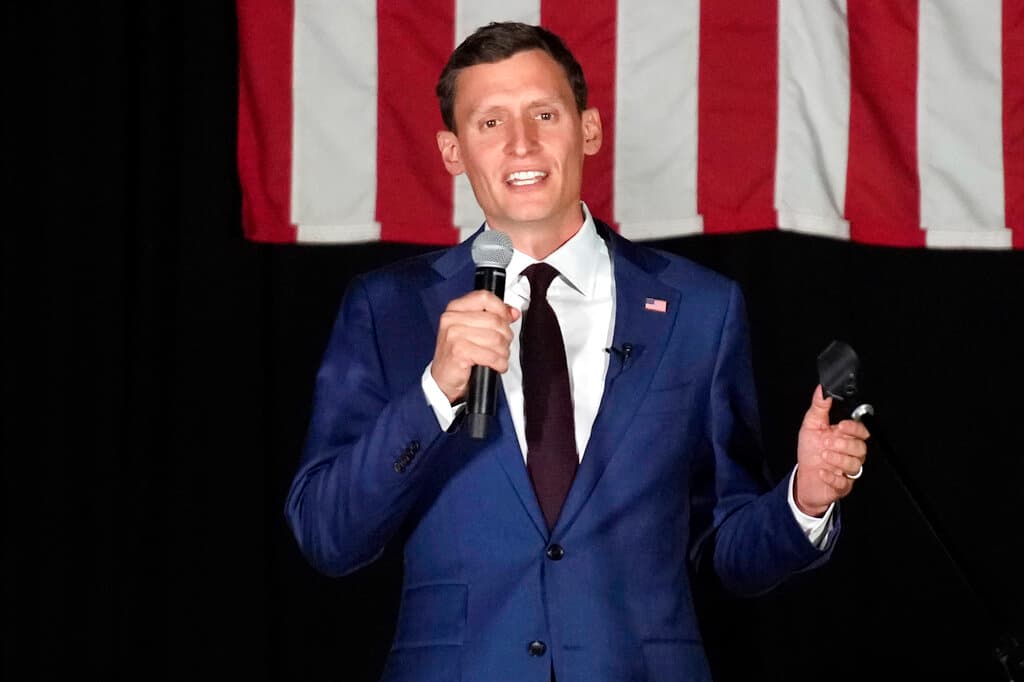In Arizona, GOP Campaign Tactics Diverge Following the Primaries
Arizona will be a test of whether GOP candidates can appeal to their hard right base and still win over enough independents to succeed in the general election.

Gearing up for the fall general election, candidates across America are choosing between two strategies: moderating their message for that election or doubling down on the hyper-partisan hyperbole that got them through the primaries.
Nowhere is the difference between the two strategies more stark than Arizona.
On July 15, two weeks before the primary election there, a Republican U.S. Senate hopeful, Blake Masters, promoted his campaign on Steven Bannon’s “War Room,” saying that “maybe calling the Democrats in power psychopaths is too kind.”
His latest post-primary ad, released on August 4 — just two days after the primary — features Mr. Masters’s wife, Catherine Masters, reading a script over footage of the couple’s children playing on swings and holding a home-made cardboard sign that says, “Blake for Senate.”
“Blake’s doing this now because he wants a country that works, you know, he wants Americans to be thriving,” Ms. Masters says in the ad. “He would make Arizona so proud.”
Mr. Masters and his campaign wasted no time pivoting to a softer message more suitable for the general election from his highly ideological pre-primary rhetoric. The Republican gubernatorial nominee, Kari Lake, a former news anchor, is doing the exact opposite.
Ms. Lake defeated her primary opponent on August 2 by about five points, and has shown no signs of moderating her message.
On August 15, Ms. Lake was on “The Charlie Kirk Show” attacking her opponent for receiving funding from philanthropist George Soros and “groveling” for a “disgusting” Planned Parenthood endorsement, adding: “it really is about the money though.”
The difference between Mr. Masters and Ms. Lake’s campaign messaging highlights the two competing philosophies of how to win a midterm election in 2022. Mr. Masters is taking the more traditional path of trying to appeal to independents; Ms. Lake is attempting to drive up turnout among her partisan base.
A political scientist at the University of Arizona, Thomas Volgy, tells the Sun that he sees the situation in Arizona as a microcosm of the national situation as America enters election season.
He argues that “pivoting anywhere near the center” and toward huge swaths of independent voters will be a challenge given the short span between primaries and the November election in states like Arizona.
“In this way Arizona becomes a fascinating test of whether it is possible for GOP candidates to appeal to their hard-right constituency and still win over sufficient numbers of independents to succeed in the November general elections,” he tells the Sun.
His bet is that statewide GOP candidates will be forced to stand by their primary positions in the face of Democratic ads using candidates’ own words against them — “to highlight extremist positions.”
While there aren’t any post-primary polls on the Arizona gubernatorial competition, July polling by Beacon Research found that, should Ms. Lake win the nomination, she would be trailing Attorney General Katie Hobbs, the Democratic candidate, by about nine points.
In the Senate race, Republican-sponsored polling by OnMessage and America Next PAC found Mr. Masters trailing Senator Kelly by five points. Nonpartisan polling by Momentive/Survey Monkey found Mr. Masters about 15 points behind his opponent.
An associate editor at Sabato’s Crystal Ball, John Coleman, said that both Mr. Masters and Ms. Lake are confronting a problem faced by candidates across America following polarized party primaries.
“You’re seeing this on both sides because the primaries are increasingly being decided by a group of voters that’s increasingly different from the general election,” he tells the Sun. “It’s two different electorates.”
More moderate Republican candidates would have been in a better starting position going into the general election, Mr. Coleman said, but they never would have stood a chance winning a contested primary.
Although he’s not sure which strategy will work better, to pivot like Mr. Masters or to drive up turnout like Ms. Lake, the results will loom large over future elections. Mr. Coleman is, however, doubtful of Ms. Lake’s strategy in this year’s environment, saying 2022 “is already on track to be a high turnout midterm. How much more turnout can parties juice out in the midterm?”

